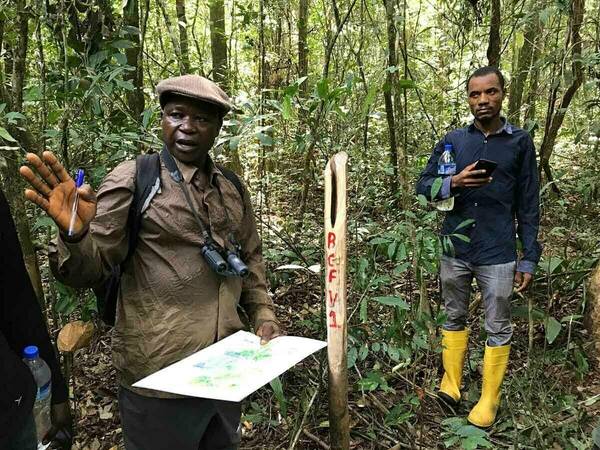Using forest resources strengthens food security, study finds

Forests can reduce hunger in rural households while also capturing carbon and advancing sustainability goals for low- and middle-income countries, according to new research by University of Notre Dame experts.
Households in Liberia that participated in forest-based activities — including collecting and processing timber, hunting bushmeat or gathering edible plants — reduced their food scarcity by 84 percent, according to a study published in the journal Food Security. The research was conducted by Daniel C. Miller, associate professor of environmental policy at Notre Dame’s Keough School of Global Affairs, and co-author Festus Amadu, a former Notre Dame postdoctoral researcher who is now assistant professor of climate policy at Florida Gulf Coast University.
“Previous research has shown that forests benefit people, but now we have evidence on a national scale,” Miller said. “Forests are a vital source of food security for forest-adjacent households in Liberia, the most forested country in West Africa.”
Miller and Amadu analyzed data from a 2019 survey by the Liberian government and the World Bank. Miller, a former World Bank senior forestry specialist, helped design the survey, which collected data from nearly 3,000 households living near forests across all 15 counties in Liberia. The researchers found that when households reported engaging in forest-based activities, they also reported food insecurity for almost three fewer months out of the year.
Food insecurity is severe in many countries in sub-Saharan Africa, including Liberia, where most rural households do not have access to enough food to meet their daily calorie intake requirements for the whole year, Miller said. Causes of this food insecurity include extreme weather events, political instability, and poor agricultural productivity caused by natural resource depletion. Existing research shows that forests may be more resilient to some of these stresses, making them increasingly vital for reducing food insecurity in countries such as Liberia, where forests comprise 69 percent of its land area.
“Forests do a lot of things for us as human beings, and yet their manifold contributions are not systematically studied and documented,” Miller said. “While forests will never substitute for agriculture on any large scale, they can serve as an important food source, particularly in lean times.”
Miller said the study’s methodology — using forest-specific data acquired on a national scale — could be applied to other forest-rich, economically poor countries in West Africa and elsewhere to further understand how forests can mitigate food insecurity.
“Forests can and should be considered by national governments in other countries not only for their climate and environmental benefits, but for their potential to support human development and well-being,” he said.
The research was supported by the Forests & Livelihoods: Assessment, Research and Engagement (FLARE) network, which Miller leads, with funding from Notre Dame Research, the Notre Dame Environmental Change Initiative and the Keough School.
In future studies, Miller and Amadu will examine how forest governance, particularly at the community level, affects how people living near forests can benefit from them. Miller also said the study’s findings have important policy implications and could be used by policymakers focused on forest management and conservation.
“The benefits that forests create for the citizens of a country are yet another reason why forests are worth managing well and conserving,” Miller said. “When you have empirical evidence at the national level, it becomes relevant not only in scholarship but also for the policy realm.”
Originally published by Renée LaReau at keough.nd.edu on July 22.
Contact: Tracy DeStazio, associate director of media relations, 574-631-9958 or tdestazi@nd.edu
Originally published by at news.nd.edu on July 22, 2024.
Latest Research
- ‘A special challenge’: German studies scholar wins National Humanities Center fellowship for research on medieval womenFor CJ Jones, the joy of research is not the answers but the journey. And the next step on that journey is a fellowship with the National Humanities Center. …
- Notre Dame Lead Innovation Team partners with local WIC program to identify, prevent lead poisoning in childrenB.A.B.E. store “shoppers” now have something new to help their families: free lead screening kits offered by the University of Notre Dame’s Lead Innovation Team.
- Notre Dame Welcomes Ninth Cohort of Warrior-Scholars for Transformative Academic JourneyNOTRE DAME, IN – The University of Notre Dame recently concluded its ninth successful Warrior-Scholar Project (WSP) boot camp, hosting 34 dedicated Warrior-Scholars from June 21st to 28th. This intensive, week-long academic residency provided transitioning service members and veterans…
- Entrepreneurship and Empowerment in South Africa study abroad program celebrates 25 yearsThis year, the Entrepreneurship and Empowerment in South Africa (EESA) program marked its 25th year of operation. EESA is a six-week summer study abroad program that enables students to help historically…
- Vatican honors Martin and Carmel Naughton with papal awardCarmel…
- Brain tumor growth patterns may help inform patient care managementAssistant Professor Meenal Datta (University of Notre Dame/Wes Evard) A team of researchers from the University of Notre Dame, Harvard Medical School/Massachusetts General Hospital, and Boston University has developed a technique for measuring a brain tumor’s mechanical force and a new model to estimate how much brain tissue a patient has lost.













